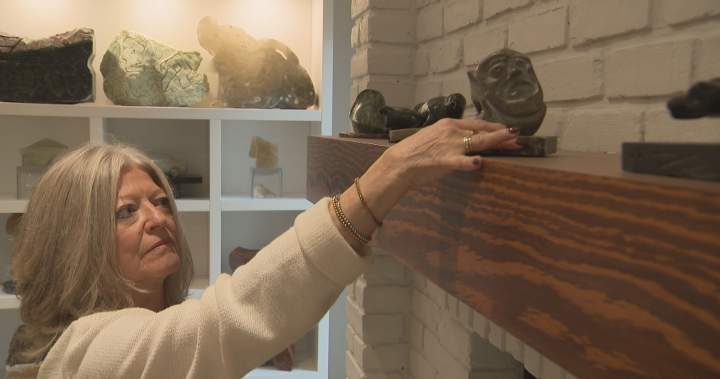Ten years after the death of her son, a Winnipeg mother is reflecting on progress being made in mental health services in Manitoba.
Bonnie Bricker’s son, Reid, had a long struggle with mental health challenges.
“About age 28 or 29, he made a really good attempt to end his life and wound up in Victoria Hospital,” Bricker told Global News.
“As parents, we didn’t know who to call, how to educate ourselves… How do you talk to a son who’s almost died doing this? We had nothing.”
Bonnie Bricker has been advocating for improvements to mental health services for years.
Jordan Pearn / Global News
In October 2015, Reid made three attempts on his life in a 10-day span. Each time, he ended up in hospital. Each time, he was released while in crisis.
“The last time we were in a major hospital, he was let go in the middle of the night. And that was the last time that anybody saw him,” Bricker said.

Get daily National news
Get the day’s top news, political, economic, and current affairs headlines, delivered to your inbox once a day.
“We all know being alone when you’re suffering from suicidal ideation is the worst thing in the world, because you feel so hopeless anyways, and now you’ve backed yourself in this corner and the only way out of that corner, if you don’t let someone help you, is off the planet.”
Since then, Bricker has been pushing for changes to mental health services in Manitoba. Reid’s passing resulted in new legislation that saw changes to the Personal Health Information Act, which would allow a medical professional to reach out to a patient’s system of care if serious harm was a possibility to the patient or others.
“I know as a parent, every time Reid went to the emergency department, I felt, ‘Finally someone is going to listen to him, finally someone is going to help him.’ And it failed him. Every. Single. Time,” Bricker said.
“Because they underestimated him. If they had talked to me, I would have given them information that he wouldn’t have given them.”
Bricker says mental health services have evolved in the past decade, and there are now resources in place that Reid didn’t have access to a decade ago, including a peer support program through Peer Connections Manitoba that allows people with lived experience to help people in crisis in community and clinical settings.
“Peer supporters, they don’t go to school to learn what they do. They go through hard things,” said Adam Milne, the peer services director at Peer Connections Manitoba.
“So someone who comes in and gets to talk to someone who’s been through something hard doesn’t feel isolated in what they’re doing, doesn’t feel isolated in their journey.”
Peer Connections Manitoba also launched the Reid Bricker Mental Wellness Fund to increase the availability of mental health supports in Manitoba.
“An ounce of prevention is worth a pound of cure, and the further we are able to help people and go alongside their journey, the better off we all are,” said Monique Levesque-Pharoah, the director of development with Peer Connections Manitoba.
Bricker says while progress is being made, there is still a long way to go, as mental health services remain largely underfunded in Manitoba.
She says she continues to share her son’s story in hopes of helping others walking a similar path that Reid once walked.
“Mental health started to really evolve,” Bricker said.
“You would never hear somebody at a restaurant talking about mental health, but now you do. You would never hear somebody saying, ‘my child is suicidal’ because of the shame and the distortion and the perception of how that person is and that they’re damaged. That is slowly going away.”
If you or someone you know is thinking about suicide, help is available 24 hours a day. Call or text 988.
© 2025 Global News, a division of Corus Entertainment Inc.
Winnipeg mom says despite progress, more mental health supports needed





